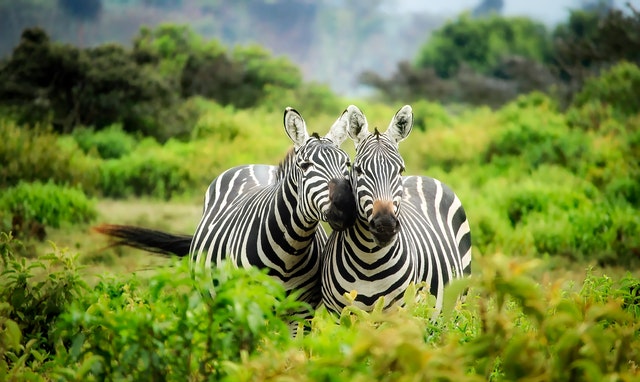
Isn’t a Safari trip just the perfect idea of a vacation with your family and kids? This is a chance of a lifetime adventure where you can watch wild animals in their natural habitat and teach your children about the wild. Moreover, safaris are an incredibly family friendly experience, and both parents and children can enjoy each other’s company and learn a lot together as they spy on the lions, elephants, and zebras in the great wild plains. The safari is perhaps the best classroom in the world for the kids and it’s all about sharing an adventure and spending quality time together.
Before booking a Safari vacation with your children, make sure to read the following tips before finalizing things.
1. Let The Anticipation Begin
Before starting the trip, make sure to get your kids interested in wildlife and let them know what lies in store ahead. Talk to them about the wildlife and watch some wildlife films together. Get them totally excited for the family adventure, and build that anticipation – which is a massive part of the magic of safari!
2. Look For A Kid-Friendly Destination
If going on a safari with children for the first time, make sure they have a good start. To do this, it’s essential to research a bit first and look for child-friendly destinations that not only offer a very good time for wildlife watching, but also provide child-friendly lodges that cater specifically to children. They (the lodge) should keep them busy and entertained when they’re not busy watching the wildlife. Make sure the lodges have facilities for babysitting, play rooms, and other family-oriented amenities.
3. Ask About The Age Restrictions
There are strict minimum age requirements at most lodges. Because of this, it is absolutely essential to learn about those requirements and make sure your children are able to take part in the game You can ask for a private safari vehicle if the children are under 12, but it can really ramp up the costs. Double check the age limits before you book. One of the biggest concerns among the lodges and safaris are the noise levels that can frighten the animals away. Baby, toddler and young child noises are one of the top reasons some lodges and safaris require older kids. Most safaris expect them to be 7 or older. However, if you have a private jeep just for your family, they might lower the age limit.
4. Check Out The Medical Facilities
There are plenty of malaria-free destinations for safari, but it’s still best to remain prepared and assume the worst. The risk rises in certain areas over others, so ask lots of questions of your trip planner (or our trusty Google search!). Take anti-malaria medication and ensure there are proper medical facilities where you’re staying. Botswana and Namibia carry a low risk of malaria, but the risks rise as you go north.
5. Plan Your Itinerary Carefully
Children can get impatient and cranky if the weather’s hot or if they need to travel on a dirt road that seems to go on for hours. You wouldn’t want to get stuck in the middle of Africa under the hot sun with cranky, hungry kids. This can spoil all the fun for everyone. So again, check with your travel operator about the roads, the weather, the driving time and safari travel conditions. However, once on the safari, you should know when to call it a day, since tired and cranky kids make for terrible safari companions. Keep the temperament and personality of your child in mind before planning your trip.
6. Follow Some Rules
In order to make the trip more manageable, set out some basic rules for the kids to follow. Keep the length of the game drives short, and do not force the children to go on and on. If they fall asleep while watching cheetahs, giraffe’s or rhinos, don’t wake them up. Use their body clock to plan the length of your game drives going forward. Return to your lodge to give your children rest. Plan some in between activities between the game drives, and do something different. You could go for some cultural activities, long walks or even horse riding. As most safaris take place in the early morning and late evening hours, things can get boring for the children. So, make sure they have plenty of rest and sleep before your start.
7. Might Have To Discuss Mating And Kill With Your Children
The wild landscape exposes primal behaviors of the animals. You might see lions mating or a pride of lions getting ready for a kill. Those subjects are new and sensitive (and sometimes scary) for your child, so be well prepared. You have to teach your children how to sit still and remain quiet so as to not to disturb the animals. Teach them how to identify animal tracks and how to keep a safe distance from the animals.
8. Safaris Are Not Just About The Big 5
Although safaris and the big 5 are synonymous, it’s equally fun to focus on the small animals. You can take a guided drive around a reserve trying to spot lions, but your children would be equally interested in the small creatures as well. However, it is essential to tell your children that safaris can be exciting, but they are much more than just a desire to see the animals. They need to be patient as they might be out in the fields for hours.
9. Take Books And A Sketch Pad When Out On A Drive
You’re on a guided safari drive with a youngster – it’s a good idea to bring a diary or a sketch pad for them in case they get bored. Ask them to observe and draw the wildlife and scenery they see around them. Or they can take notes in their journals. Urge them to note the shape of the animals, the colors, the way they walk, etc… You’ll have lots to discuss. Bring along any animal or bird books, and try to kick off some conversation about nature. You can also get wildlife guidebooks once at your lodge and pull them out if or when your little one starts getting bored.
10. Cameras, Recorders, And Binoculars
Most cameras are for adults, and not a toy you want your son or daughter to have – unless they’re old enough to be careful with it. But a good pair of durable safari binoculars are a must-have for your trip. If by chance you have more than one child on the trip, it’s best to have binoculars for each child so they don’t fight over them when the excitement begins. They will keep them engaged during the game drive, and lets them watch every move the animals make. The elder children can easily handle a camcorder, and it can be exciting for them to shoot their own wildlife videos and create some great multi-media memories.
Everyone has their own vision of what a safari would be like, and how it would be to watch a lion or cheetah from close quarters. After all, there are no shortage of books, movies, National Geographic and Discovery channels on the subject of wildlife and safaris. But, nothing can beat the experience of exploring vibrant Africa and its wildlife on a safari.
Don’t get anxious about taking your kids on a Safari, or planning a trip to Africa. The hardest part is just packing to get there. Once you have that knocked out, the rest will be fun-filled, memorable and exciting! Nothing can be more precious than the look of wonder on the face of your child as he sees a giraffe or lion in their habitat for the first time. This is an opportunity to get closer to nature (and your kids!)
And finally, if you’re too worried about them on the trip, then begin with baby steps. Take them first to a zoo or a smaller game park within your state or home country. Let them become more receptive towards nature, and develop a natural curiosity to learn more about wild animals. Then you can step up to the real deal safari trip when they’re ready.



